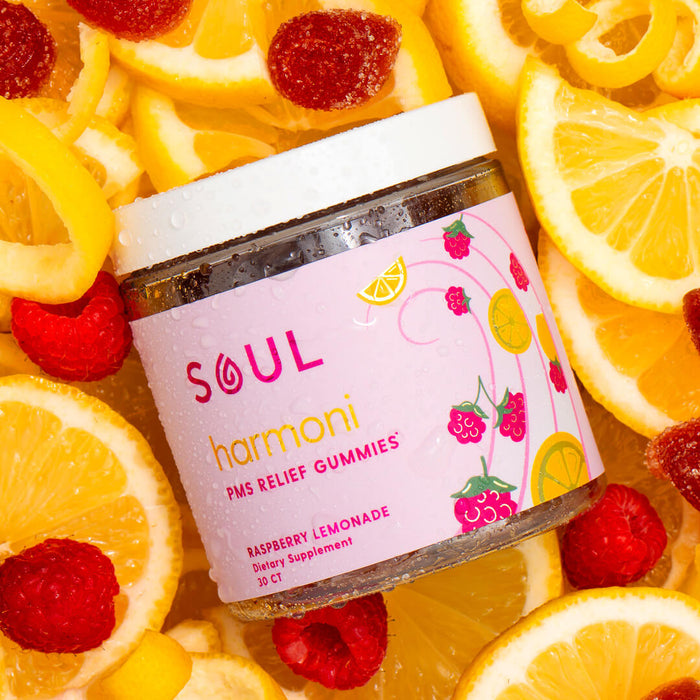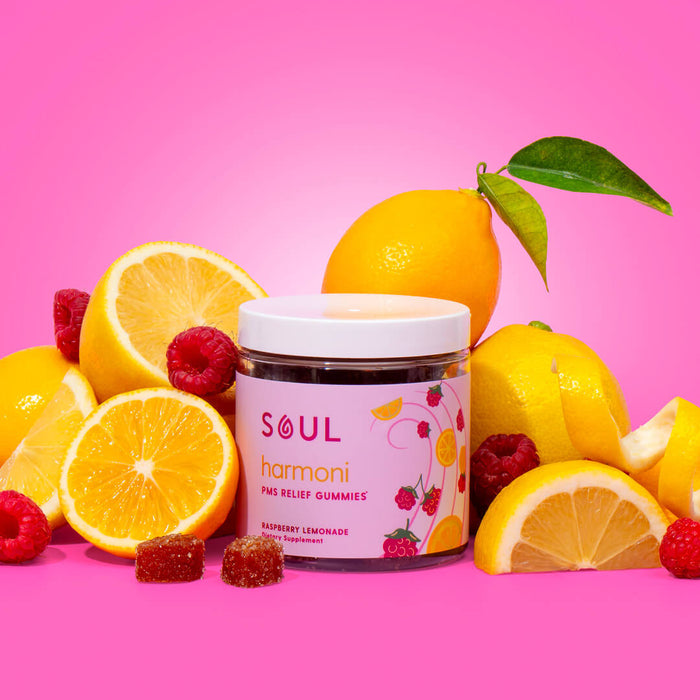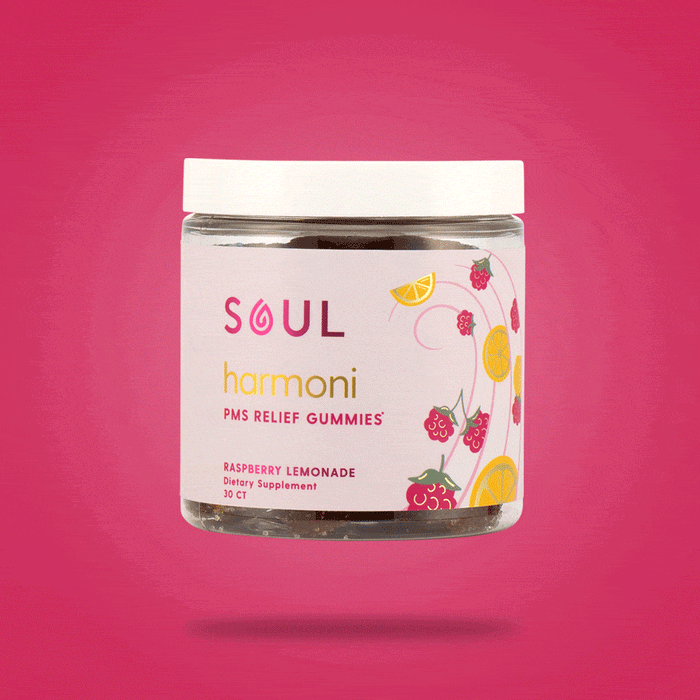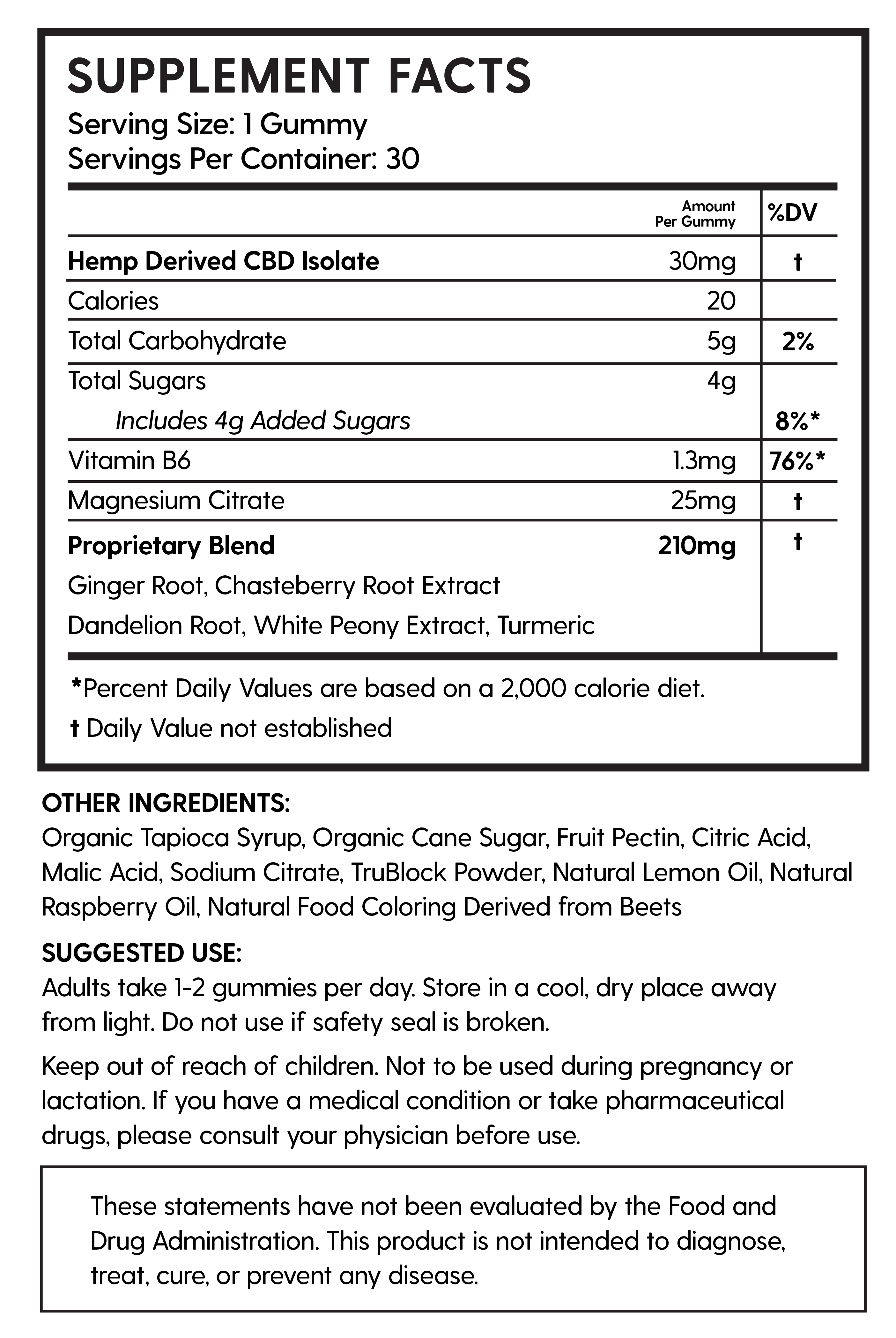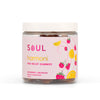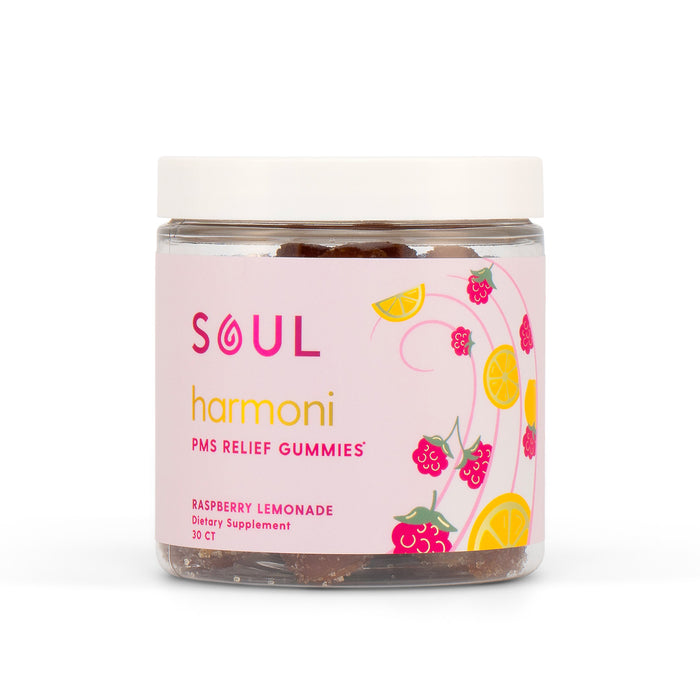
Harmoni Gummies
Subscribe & Save undefined%
Cancel or Skip Anytime.
Orders Renew at 15% Off.
The Upside
Beat the Bloat
Crush Your Cramps
Delicious Relief
How to Use
- Starting a week before “your week” take 1-2 gummies per day.
- Let your wingwoman beat the bloat and crush your cramps.
- Take back your week!

Everyone is Talking

.
What Are PMS Symptoms And How Do They Affect Daily Life?
Premenstrual Syndrome (PMS) includes a variety of physical and emotional symptoms that occur one to two weeks before menstruation. Here's a deeper look at these symptoms:
Common PMS Symptoms
PMS symptoms can vary widely but often include mood swings, irritability, anxiety, depression, fatigue, bloating, breast tenderness, and headaches. These symptoms can be mild for some women but severe for others, significantly impacting their daily routines.
Emotional Impact
Mood swings, irritability, anxiety, and depression can cause emotional distress, affecting relationships and social interactions. Women might find themselves feeling unusually upset, angry, or sad, impacting their overall mental health and well-being.
Physical Discomfort
Physical symptoms like bloating, breast tenderness, and headaches can cause significant discomfort, making it difficult to perform everyday tasks. Fatigue can also decrease energy levels, leading to decreased productivity and a general sense of lethargy.
Effect On Daily Activities
The combination of emotional and physical symptoms can disrupt daily life, affecting work performance, social activities, and overall quality of life. Understanding these symptoms is crucial for finding effective management strategies, including lifestyle changes and the use of supplements.
How Does CBD Help With PMS Discomfort?
CBD, or cannabidiol, is gaining popularity as a natural remedy for alleviating various PMS symptoms. This non-psychoactive compound derived from the cannabis plant interacts with the body's endocannabinoid system to regulate pain, mood, and inflammation. Here’s how CBD can help:
Reducing Menstrual Cramps
CBD helps reduce menstrual cramps by interacting with the endocannabinoid system to modulate pain perception. Its analgesic properties make it effective in diminishing the intensity of cramps, providing significant relief for women during their menstrual cycle. By targeting specific pain receptors, CBD can offer a natural alternative to over-the-counter pain relievers.
Lowering Anxiety Levels
CBD has anxiolytic properties, meaning it can help lower anxiety levels. By influencing the receptors in the brain that regulate mood and stress responses, CBD can create a calming effect, helping to manage the heightened anxiety that often accompanies PMS. This can lead to improved overall mental health and a more stable emotional state during the premenstrual period.
Improving Mood Stability
One of the key benefits of CBD is its ability to improve mood stability. It influences serotonin receptors, which play a significant role in mood regulation. By enhancing the availability of serotonin in the brain, CBD can help reduce mood swings and promote a more balanced emotional state during PMS. This can be particularly beneficial for those who experience severe mood disturbances during their menstrual cycle.
Reducing Inflammation And Tenderness
The anti-inflammatory properties of CBD contribute to lessening the severity of bloating and breast tenderness. By reducing inflammation, CBD can alleviate the physical discomfort associated with these PMS symptoms, making it easier to manage daily activities. This anti-inflammatory action can also help with other symptoms like headaches and joint pain, providing comprehensive relief from PMS-related discomforts.
How Does Magnesium Support Women During PMS?
Magnesium is essential for women experiencing PMS, offering multiple benefits that can significantly alleviate discomfort. Here's a closer look at how magnesium helps:
Reducing Muscle Cramps
Magnesium helps reduce muscle cramps, a common PMS symptom, by promoting muscle relaxation and easing tension. It acts as a natural muscle relaxant, which can alleviate the severity and frequency of cramps experienced during the premenstrual period.
Stabilizing Mood
Magnesium has mood-stabilizing properties that can help reduce irritability and mood swings associated with PMS. It plays a crucial role in neurotransmitter function and the regulation of mood, helping to balance emotions and reduce anxiety.
Combating Bloating And Water Retention
Magnesium helps combat bloating and water retention by regulating fluid balance in the body. It supports kidney function, aiding in the excretion of excess fluid, which can significantly reduce the feeling of bloating and discomfort.
Enhancing Overall Well-being
Including magnesium-rich foods or supplements in your diet can enhance overall well-being during PMS. Magnesium supports energy production and reduces fatigue, helping women feel more energetic and less drained during their menstrual cycle.
How Can Supplements Help Manage PMS Symptoms?
Supplements can significantly aid in managing PMS symptoms by providing essential nutrients and compounds that support hormonal balance and reduce inflammation. Here’s how they can help:
Supporting Hormonal Balance
Many supplements contain vitamins and herbs known for their ability to balance hormones. For example, chasteberry root can help regulate prolactin levels, which in turn can reduce symptoms like breast tenderness and irritability. Hormonal balance is crucial for minimizing the severity of PMS symptoms.
Reducing Inflammation
Inflammation is a common underlying cause of many PMS symptoms such as cramps and bloating. Supplements like turmeric, with its active compound curcumin, have potent anti-inflammatory properties that can help reduce these symptoms. By lowering inflammation, these supplements can alleviate physical discomfort associated with PMS.
Alleviating Mood Swings
Supplements like magnesium and vitamin B6 are known for their mood-stabilizing properties. Magnesium helps regulate neurotransmitters that influence mood, thereby reducing mood swings and irritability. Similarly, vitamin B6 plays a role in the synthesis of serotonin, which can help improve mood and reduce anxiety.
Enhancing Overall Well-being
Incorporating supplements into your diet can enhance overall well-being during the premenstrual period. For instance, magnesium can reduce fatigue and improve energy levels, while calcium can help alleviate symptoms like bloating and cramps. By addressing these common issues, supplements can contribute to a better quality of life during PMS.
How Should Supplements Be Taken For Maximum Effectiveness?
To achieve the maximum effectiveness of supplements, it is essential to follow specific guidelines and practices. Here’s how to ensure you’re getting the most out of your supplements:
Consistent Usage
Consistency is key when taking supplements. It's important to take them daily as directed to build up the necessary levels in your body. Skipping doses or taking them sporadically can reduce their effectiveness and delay the desired results.
Starting With The Lowest Effective Dose
Begin with the lowest effective dose to gauge how your body responds to the supplement. Gradually increase the dose if necessary, based on the guidance provided on the supplement label or by a healthcare professional. This approach helps in minimizing potential side effects while optimizing benefits.
Timing And Scheduling
The timing of supplement intake can significantly impact their effectiveness. For certain supplements like chasteberry or magnesium, starting them a week before your menstrual cycle can optimize their benefits. This proactive approach helps in mitigating PMS symptoms before they become severe.
Taking With Food
Taking supplements with food can enhance their absorption and reduce the risk of gastrointestinal discomfort. Many vitamins and minerals are better absorbed when taken with meals, which can also help in minimizing any stomach-related side effects.
What Role Does Turmeric Play in Managing PMS?
Turmeric is well-known for its powerful anti-inflammatory properties, making it beneficial for managing PMS symptoms. Here's how turmeric can help:
Reducing Inflammation And Pain
The active compound in turmeric, curcumin, is a potent anti-inflammatory agent. It helps reduce inflammation and pain associated with menstrual cramps. By decreasing the production of pro-inflammatory chemicals, curcumin can provide significant relief from the discomfort of PMS, making it easier for women to go about their daily activities without being hindered by pain.
Regulating Mood Swings
Turmeric can aid in regulating mood swings and combating depression. Curcumin influences brain chemicals such as serotonin and dopamine, which play crucial roles in mood regulation. By increasing the levels of these neurotransmitters, turmeric can help stabilize mood and reduce the emotional fluctuations often experienced during PMS. This can lead to improved mental health and a more balanced emotional state.
Supporting Digestive Health
Turmeric also supports digestive health, which can be beneficial during PMS when digestive issues like bloating and gas are common. It promotes healthy digestion by stimulating bile production and enhancing the breakdown of fats. This can help alleviate gastrointestinal discomfort associated with PMS and improve overall digestive function, reducing symptoms like bloating and indigestion.
Enhancing Overall Well-Being
Incorporating turmeric into your diet or taking it as a supplement can enhance overall well-being during PMS. Its multiple health benefits, from reducing pain to improving mood, make it a valuable addition to a PMS management plan. Additionally, turmeric's antioxidant properties can help protect the body from oxidative stress, further supporting overall health and vitality.
Sources:
- Canning, S., Waterman, M., & Dye, L. (2006). Dietary supplements and herbal remedies for premenstrual syndrome (PMS): a systematic research review of the evidence for their efficacy. In www.ncbi.nlm.nih.gov. Centre for Reviews and Dissemination (UK). https://www.ncbi.nlm.nih.gov/books/NBK72353/
- What Supplements Help with PMS? (n.d.). WebMD. https://www.webmd.com/women/pms/supplements-help-with-pms
- Kaewrudee, S., Kietpeerakool, C., Pattanittum, P., & Lumbiganon, P. (2018). Vitamin or mineral supplements for premenstrual syndrome. Cochrane Database of Systematic Reviews. https://doi.org/10.1002/14651858.cd012933
- OASH. (2018, March 16). PMS relief. Womenshealth.gov. https://www.womenshealth.gov/menstrual-cycle/premenstrual-syndrome
- Higuera, V. (2012, July 25). PMS (Premenstrual Syndrome). Healthline; Healthline Media. https://www.healthline.com/health/premenstrual-syndrome

